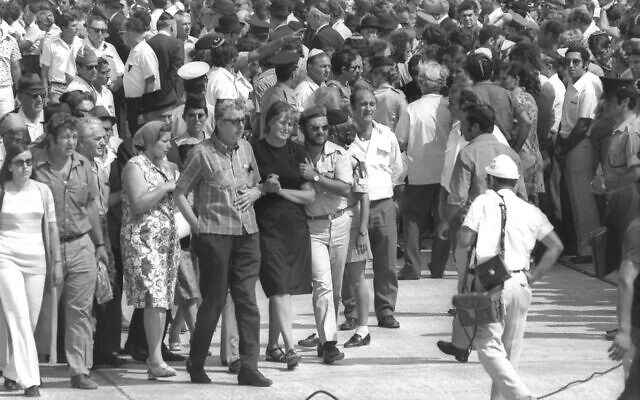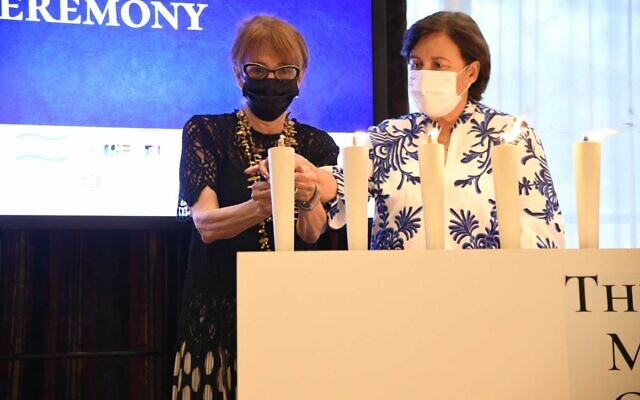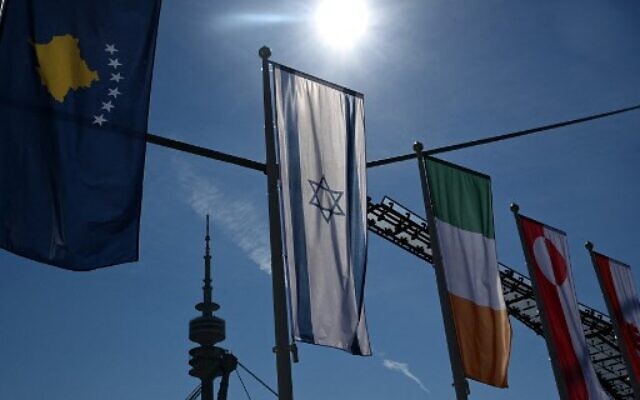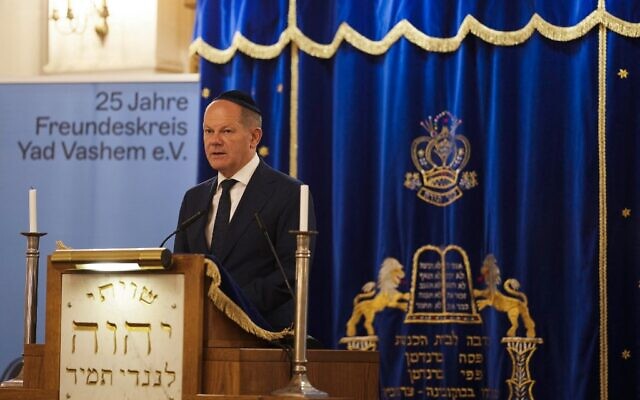Germany’s President Frank-Walter Steinmeier admitted shame over the decades that it took for Berlin to agree compensation for the bereaved families of Israeli victims in the 1972 Munich Olympics attack, saying Germany had avoided responsibility over the massacre for too long.
“That it took 50 years to reach this agreement in the last days is indeed shameful,” said Steinmeier, standing next to his Israeli counterpart Isaac Herzog, with whom he will be attending a commemoration ceremony in Munich on Monday.
A row over the financial offer previously made by Berlin to victims’ relatives had threatened to sour the ceremony, with families initially planning a boycott.
But a deal was finally agreed on Wednesday offering $28 million (NIS 94.4 million) in compensation. It also — for the first time — sees the German state acknowledging its “responsibility” in failings that led to the carnage.
In a speech at a state banquet for Herzog, Steinmeier acknowledged that “our responsibility as Germans includes shedding light on the many unanswered questions, the blind spots of the attack in Munich — and also the blind spots in our handling of the attack since then.”
“For far too long, we did not want to acknowledge the pain of the bereaved families. And for far too long, we did not want to acknowledge that we, too, had to shoulder some of the responsibility: it was our job to ensure the safety of the Israeli athletes,” he said, noting that some of the members of the Israeli team had been Holocaust survivors.
On September 5, 1972, eight gunmen of the Palestinian terror group Black September stormed into the Israeli team’s rooms at the Olympic village, shooting dead two and taking nine Israelis hostage.
A member of the Palestinian terror group which seized members of the Israeli Olympic Team at their quarters at the Munich Olympic Village appears with a hood over his face on the balcony of the village building where the terrorists held several team members hostage, September 5, 1972. (Kurt Strumpf/AP)
West German police responded with a bungled rescue operation in which all nine hostages were killed, along with five of the eight hostage-takers and a police officer.
The Games were meant to showcase a new Germany 27 years after the Holocaust but instead opened a deep rift with Israel.
Herzog underlined the pain faced by the bereaved relatives, saying they simply “hit a wall” whenever they tried to raise the issue with Germany or even with the International Olympic Committee.
“I think there was tragic suppression here,” he said, noting the litany of failings that were “inhuman and incomprehensible” such as “the fact that the hostages were being led to slaughter and the Games went on.”

Weeping relatives of the Munich massacre arrive at the Lod Airport for a memorial service, ahead of the funeral processions at local cemeteries, September 1972. (Government Press Office)
After an initial suspension, then-IOC president Avery Brundage had declared that “the Games must go on.”
Forty years later, the IOC was widely criticized for refusing to dedicate a moment of silence to the victims during the opening of the London Games.
The same year, Israel released 45 official documents on the killings, including specially declassified material, which lambasted the performance of the German security services.
Included in the reports is an official account from the former Israeli intelligence head Zvi Zamir who said the German police “didn’t make even a minimal effort to save human lives.”
Relatives of victims have over the years battled to obtain an official apology from Germany, access to official documents and appropriate compensation beyond an initial 4.5 million euros.
As recently as just two weeks ago, relatives of the victims said they were offered 10 million euros — including the 4.5 million euros already given.
“I came home with the coffins after the massacre,” Ankie Spitzer, whose husband Andre Spitzer was killed in the hostage-taking, told AFP.

Ankie Spitzer (R) at the Israeli memorial for the victims of the 1972 Munich Olympics massacre, in Japan on August 1, 2021 (Israel Olympic Committee)
“You don’t know what we’ve gone through for the past 50 years.”
Herzog voiced hope that the agreement would bring “this painful episode to a place of healing”.
“I hope that from now on, we shall continue to remember, invoke, and most importantly reaffirm the lessons of this tragedy, including the importance of fighting terror, for future generations,” said the Israeli president.
Steinmeier said he would address some of the German failings during his speech at the ceremony on Monday. “I will speak about… some misjudgments, some misbehaviors and some errors made during the Games in Munich,” he said.

A photo taken on August 17, 2022 shows Israel’s national flag (2L) at the Olympic Park in Munich, southern Germany. (Photo by INA FASSBENDER / AFP)
Herzog will also on Tuesday address the Bundestag and visit the Nazi concentration camp Bergen-Belsen — where his late father and former Israeli president Chaim Herzog counted among the liberators as a British Army officer in 1945.
He will also meet German Chancellor Olaf Scholz, a month after Palestinian Authority President Mahmoud Abbas sparked outrage during an official visit to Germany, telling a Berlin press conference alongside Scholz that the Palestinians had suffered “50 holocausts.”

German Chancellor Olaf Scholz speaks during a ceremony marking the 25th founding of the ‘Freundeskreis Yad Vashem’ society of German friends of Yad Vashem at the Central Orthodox Synagogue Joachimsthaler Strasse in Berlin, Germany, on September 4, 2022. (Markus Schreiber / POOL / AFP)
At a ceremony at a Berlin synagogue on Sunday night marking 25 years for the Friends of Yad Vashem organization in Germany, Scholz referred to the row over Abbas’s statement, after previously calling the comments outrageous.
“We will not tolerate anti-Semitism in Germany, and that includes relativizing the Holocaust,” he said.
